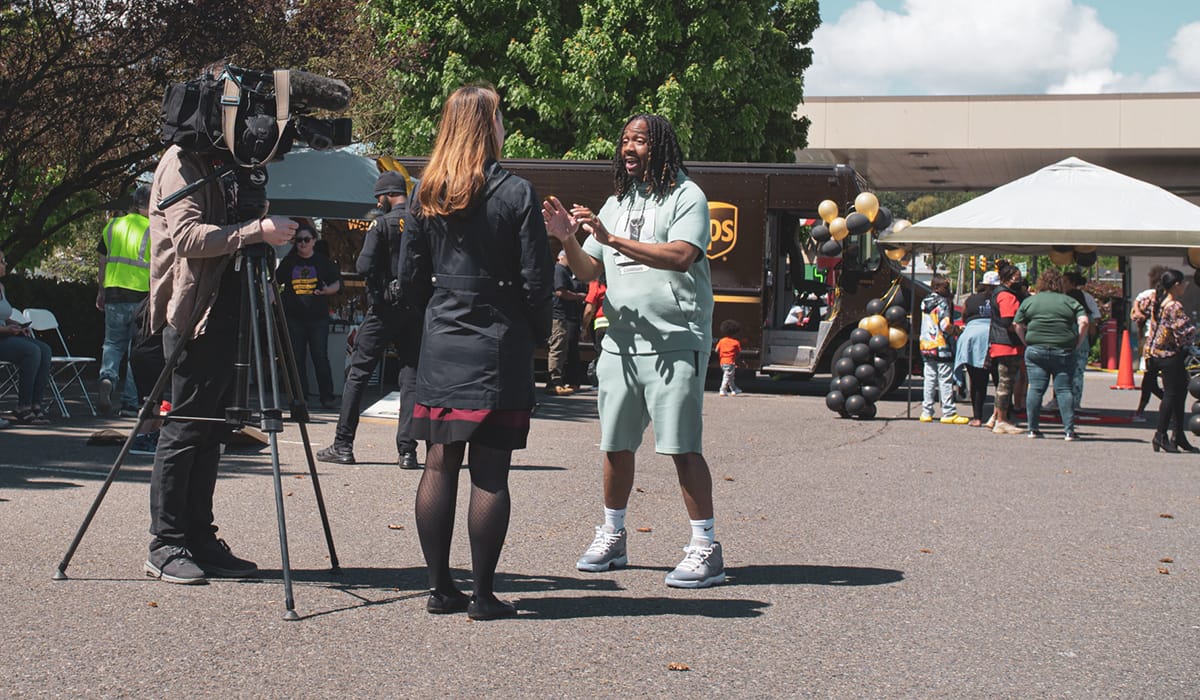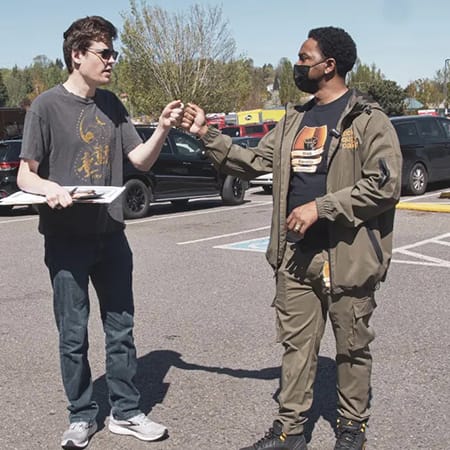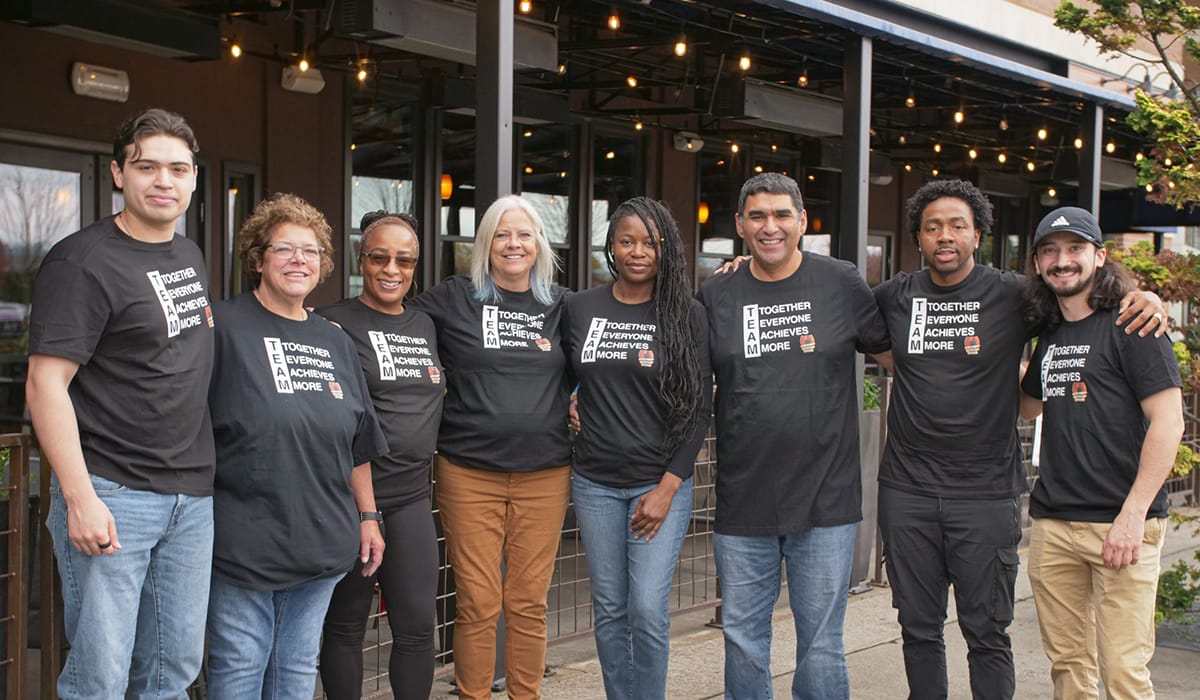Community Leader Builds Network of Hope Mentoring Kids, Providing Resources and More

Meet Daily Point of Light Award honoree Anthony Curtis. Read his story, and nominate an outstanding volunteer or family as a Daily Point of Light.
Like many, Anthony Curtis was deeply affected when he saw the video of George Floyd’s murder in 2020. Anthony is a 35-year-old, married father of four with a deeply held desire to help those in his community overcome challenges and achieve, changing the narrative of Black culture. He has been active in his community for many years as the executive director of the Youth Violence Prevention Network and as a volunteer at his church. But in response to the call for change, he founded the Black Equality Coalition (BEC) to address the needs of underserved communities and to empower Black youth through mentorship and community engagement.
Five years later, his work — and that of many dedicated volunteers — creates a sense of ownership and pride in the community. And his Bridging the Gap programming brings people of different backgrounds, ethnicities, cultures and beliefs together to create positive change, just as Anthony intended it.
What inspires you to volunteer?
It always just seems right. There’s always a need in this world. I grew up in the Southside of Chicago where the community is littered, and there’s gang violence and police sirens. Those things had a direct impact on my life. I wanted the kids of this generation to see something different, to be the solution instead of the problem.

Tell us about your volunteer role with the Black Equity Coalition.
I’m the founder. We started the Black Equality Committee at my job — I’m a supervisor at UPS — in response to George Floyd’s murder. That really hit me hard. When I saw George Floyd’s face being pressed against the cement, I saw my face. I saw my brother’s face, my neighbor’s face. And then you’ve got to go into corporate America and be handled as if these events didn’t just happen, following Breonna Taylor and others.
Something had to be done. I didn’t know what, but I allowed myself to be expressive. We started having heartfelt conversations as supervisors and formed a committee. I introduced managers in the warehouse to the community in order to build a bridge of unity. Without the support of the community as your consumers, you don’t have a business. I wanted to get involved in the community that’s locked out of a lot of resources.
We got out there and cleaned up the Safeway. We went where gun violence was happening and served food and gave away clothes and hygiene products. We brought people out to show what the day-to-day life looks like for individuals growing up in a community with poverty and violence. We started serving schools with heavy BIPOC populations and low-income households. I wanted to be specific that we serve Black families. That didn’t mean that we weren’t going to serve anybody else. We were just going to make sure Black families were at the front of the line with everyone else.
What is Bridging the Gap?
It’s made up of five programs: the “I am Unstoppable” mentor program; Lori’s Closet, which is the all-inclusive program for free clothes, hygiene products and other essential items; “Adopt a Family”, which provides Christmas gifts for underserved families; and annual Back-to-School Supply and Thanksgiving Food drives.
How have you seen your mentoring program affect kids?
This is our second school year. The first year we had 25 kids, grades three through five. This year, we have 35-40. I didn’t want to start off at middle or high school. That’s hustling backwards. We want to prevent the kids from making bad decisions and ending up somewhere they don’t want to be. So, we start at the earliest age possible and follow them through high school to ensure their success.
We have data proving that kids are better with mentors, specifically mentors of similar cultures who look like them. The chances of them graduating and excelling in life is much higher when they have mentors and people they can look up to and ask questions about different careers. That helps combat the school-to-prison pipeline. We can help them stay in school.
A lot of them are in poverty. Times are hard, and these kids see drug dealers and hear about people doing bad things to make money. School and the corporate world seem far off to them. We change their perspective by bringing in experts and top-earners in their field to tell them about other possibilities. There are plenty of opportunities; they’re just not being displayed in our community. And if they are being displayed, it’s by individuals who don’t look like them, so it doesn’t seem real.
What’s been the most rewarding part of your work?
I got a video recorded from two young girls when I was at the school the other day. I let them use my phone while I was playing basketball with the boys. When I got it back, I had recorded video about how BEC is like the family they never had and where they were when they started versus where they are now.
It’s also great hearing from teachers and my team saying I’ve created a platform for them to maximize their service. It’s rewarding for me to see other people doing something that they love and making a real impact.

Tell us about future partnerships, programs or events that you are excited about.
We have a partnership with an organization made up of currently and formerly incarcerated people. They’re teaching elementary school kids about civic engagement, politics and the criminal justice system. They explain how to peacefully protest and how laws work.
We have a career exploration fair coming up April 26. We have civics training for our team and educators at the school where we have the mentoring program. And we’ve got a mock legislative session happening with the kids. They’re going to argue for more recess time and no homework and things of that nature.
What do you want people to learn from your story?
Don’t limit yourself. Go after everything that you desire. I desire to serve people. I have dreams to help as many people as I can before I transition from this world. If you have a similar desire, go after it. It’s hard, but everything is hard. You just choose your hard. Stay consistent and keep moving.
Do you want to make a difference in your community like Anthony? Find local volunteer opportunities.
